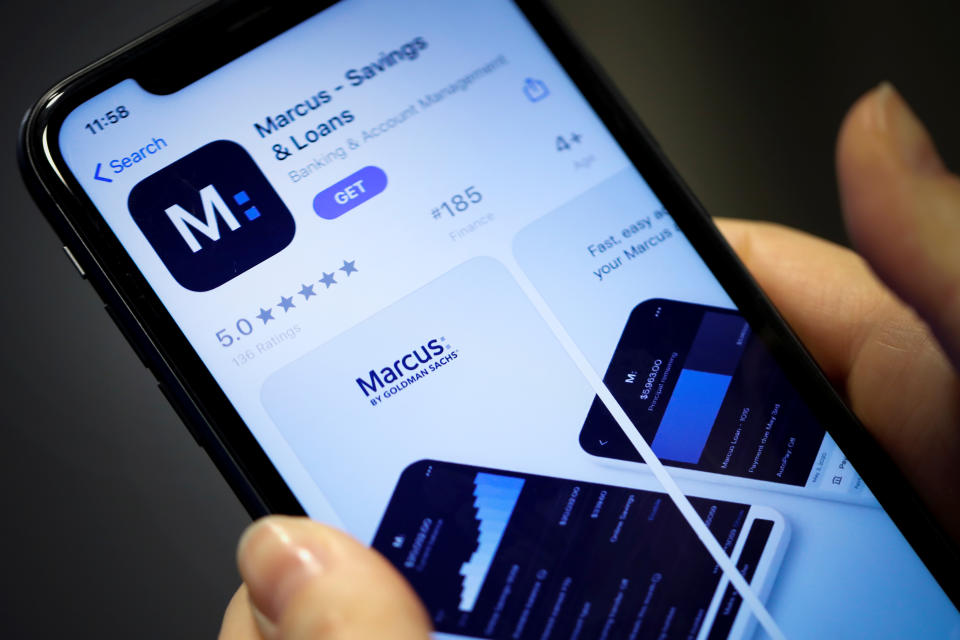At first investor day, Goldman Sachs pledges a 'path forward' with emphasis on banking, culture
Goldman Sachs (GS) hosted its first-ever investor day on Wednesday at the firm’s New York headquarters, outlining its plans for long-term growth and an emphasis on consumer banking.
Toward that end, the the 150-year-old investment banking giant intends to focus on fee-based revenues, and more sustainable returns.
“Today is about our path forward,” CEO David Solomon said during his opening remarks.
“Our goal is to clearly communicate our strategic direction, plans for execution, our financial objectives, and our paths to achieving these goals business by business,” Solomon said.
“All of this comes in the spirit of communicating directly with you about the ways in which we believe we can drive greater shareholder value,” he added — highlighting what the bank stands for, and what makes it different from the competition.
Big companies are under increasing pressure to think more actively about inequality, the environment and other social issues.
Goldman’s chief pledged to create a “north star” to guide strategy, and improve the firm’s culture. Declaring the firm “proud advocates of capitalism,” he articulated a strategy to boost sustainable growth and financial opportunity for all.
“This comes at a moment when I believe all companies need to more clearly explain their purpose and their values for their employees, for their clients, for their shareholders, and to their communities,” Solomon said.
Goldman is still reeling from a scandal involving 1MDB, the Malaysian sovereign wealth fund that was the center of a wide-ranging scheme to loot billions from its funds. The banking giant was implicated in the affair, and is reportedly negotiating to pay a stiff $2 billion fine for its involvement.
Addressing the scandal, Solomon insisted that Goldman “must always have an unrelenting commitment to doing the right thing, always. In the wake of our experience with Malaysia, I’m keenly aware of how the actions of a few can harm our reputation, our brand, and our performance as a firm.
Solomon pointed to some of the changes made during his tenure, including a push for more transparency and openness. He added that this transparency would “improve your understanding of our business, improve visibility into our activities, and enhance our own accountability.”
Banking, banking and more banking

Turning to the business, Solomon outlined medium-term three-year goals of greater than 13% return on equity (ROE), greater than 14% return on tangible equity (ROTE), and an efficiency ratio of 60%.
Goldman’s nascent consumer bank, which launched just over three years ago, presents a growth opportunity. The firm has a “broader ambition to build the digital bank of the future,” with goals to grow to $125 billion in deposit balances and $20 billion in loan balances in the next five years.
John Waldron, Goldman’s COO/president, drilled down on how the firm will hit those ambitious growth goals by highlighting four areas of focus — including transaction banking, digital consumer banking, and wealth management.
According to Waldron, transaction banking is a “compelling addition” for the firm’s corporate clients — even in a “large and fragmented” market. Goldman’s five-year plan is to have $50 billion in deposit balances and $1 billion in revenues.
To achieve those lofty goals, the firm has built out a 350 person team, processed $3 trillion in transactions across five currencies, and expects the full platform launch in the first half of 2020. Waldron added that he has a “real conviction” that Goldman can build a large business even with a modest share in the market.
Another opportunity is to “reshape and grow” the alternatives platform, a rapidly growing asset class amongst investors. Over five years, the plan is to garner net inflows of $100 billion while hitting $4 billion in capital reduction.
Waldron noted that alternatives are a core part of the firm and that its “merchant banking DNA runs deep.”
There are also plans to expand the firm’s wealth offering by adding corporate clients, hiring talent, and debuting new products.
Elsewhere, Goldman will focus on the opportunity in China, a strategically key market. Waldron noted that the Chinese government is taking actions to open up the markets, and the firm has applied for 100% ownership of its business there.
While Goldman will remain patient, the “scope of the opportunity remains attractive,” he added.
Julia La Roche is a Correspondent at Yahoo Finance. Follow her on Twitter.
Read the latest financial and business news from Yahoo Finance
Follow Yahoo Finance on Twitter, Facebook, Instagram, Flipboard, SmartNews, LinkedIn, YouTube, and reddit.
